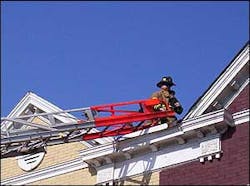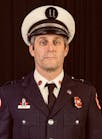Company ranks as top U.S. engine company in Firehouse Magzine's National Run Survey.
WAHSINGTON, D.C.-- It's 2:30 a.m. and the crew of Engine Company 10 has been waken for its fourth medical call just two hours after they retired to bed.
"That's why they call this the House of Pain," Firefighter Michael Puglisi says in a groggy tone.
The slogan can be found in numerous spots in the firehouse -- one firefighter even has "House of Pain" tattooed across his neck.
It's something they have pride in. But not now, nearing the end of their 24-hour shift; now they're tired.
"It's about how many calls you get and how it wears you down," Joe Myers, who has been with Engine 10 for 12 years, said of the slogan. "Here, it's all about how many calls you ran after midnight, not how many you ran during the day.
The number of calls "just wears on you man, it just wears on you."
Ranking Up There
For close to two decades straight, Engine 10 has routinely led Firehouse Magazine's National Run Survey as the busiest engine company in the U.S.
This year the company led the list for 2006 released in the July issue of Firehouse Magazine with 7,217 reported calls. D.C. as a whole reported 149,395 calls. The district's service area encompasses an estimated 582,049 people.
Engine 10's station is located in the Trinidad section of the city. The urban community is primarily made up of rowhouses. A lot of them are run down and a lot are low income housing units.
The company shares a station with Truck 13 that was built in 1925. Engine 10 was established in 1895 and was previously located on Maryland Avenue.
Truck 13 was narrowly beaten out by Tower 3 as the busiest ladder company in D.C. for 2006. Tower 3 was listed as the tenth-ranked ladder company in the run survey.
On Friday, July 13, Firehouse.com spent an entire shift with Engine 10 to get a better idea of just how busy the station is.
The station runs all 24-hour shifts beginning at 7 a.m. and ending at 7 a.m. the next morning. Each firefighter works eight shifts per month.
During this particular day, the wheelman for Engine 10 was Firefighter Brian Thrasher, who has been with the company for four years. Captain Michael Donlon was the commanding officer while firefighters Puglisi and firefighter/paramedic Billy Kendall were on the engine.
Engine 10 is one of 33 engine companies in D.C. and is one of 34 paramedic units in operation, according to an application submitted for the run survey.
The company receives an average of 450 calls a month, and while a majority of them are medical calls, it still receives one to two fires per week.
The last working fire Engine 10 responded to was six days earlier on the 1100 block of Montello Ave.
Puglisi, who has only been with Engine 10 for two months, said this company doesn't compare to his previous experience with Engine 2, where he spent a majority of his 3-and-a-half years with D.C. Fire-Rescue.
He said that while with 2 -- located across from the Verizon Center, which houses an NBA and NHL team -- the company would respond to 20 calls a day at the most. Engine 10 responds to 20 calls on average.
An Early Start
The first call of the shift is a medical call dispatched located at a homeless shelter on the 1300 block of New York Ave.
Breakfast had just begun and the crew members of Engine 10 covered their dishes and jumped on the engine. This isn't unusual, as every meal during the day was interrupted for a call of some sort.
"We're heading to a building that houses 300 homeless people a night and when they let out in the morning we usually get calls," Donlon said on the way to the call.
The engine exited the house, swung past Gallaudet University -- a national university for the deaf -- and onto New York Ave.
The patient was treated for shortness of breath.
After returning to the firehouse, the crew of Engine 10 finishes breakfast. Truck 13 has since finished eating and awaits their next call.
Following breakfast, Kendall, the newest firefighter on the shift, led cleanup, starting in the kitchen/break room and moving to the engine room.
The rest of the crew from Engine 10 and Truck 13 are sitting around a table next to the truck, reading newspapers and shooting the breeze.
Kendall said that while a lot of the firefighters pick on him at times, it's all part of being the new guy.
"If they're not messing with you, that's when you need to be worried," he said.
Breakfast needs to be eaten before 8:30, but Donlon said the station's firefighters are often done before 7 a.m. After that time, the kitchen and engine room are cleaned.
"They make it very easy to do my job," Donlon said, stating that a big part of most officers' job is babysitting their crew, to which he said: "Not here."
Later in the day, a former firefighter on Engine 10, Sgt. Danny McCoy echoed those sentiments.
"It's not the officers that make this company great, it's the people that are here everyday," he said. "They make the job easy for the officers.
"(The department) puts people here, they leave people here," he said. "There're a lot of good firefighters -- legends of the D.C. fire service -- who came through Engine 10."
McCoy, who was a member of Engine 10 for seven years before being promoted this past January, said firefighters within the station work their way up to technicians and then stay in those positions for a long time. He said this allows traditions of Engine 10 and Truck 13 to be passed on.
Preserving Traditions
Truck 13's driver, John Selestok, nicknamed "Slap," has worked in the station for over 15 years.
He said that to his knowledge, 10 has been the busiest engine in Firehouse Magazine excluding 1998 when the run stats were submitted late. That year an engine in San Francisco was selected as the busiest engine.
Selestok helped shed some light on the station's traditions, one of which is the visible name "Trinidad Fire Department" in multiple spots in the firehouse.
Trinidad Ave. is located next to the station, and the area between Bladensburg, West Virginia, Mount Olive and Florida avenues is considered to be the area of Trinidad.
Because of this, Selestok said, the station began calling itself the Trinidad Fire Department. The name is posted in different parts of the station and the firefighters even painted the firehouse doors hunter green at one point before they were forced to change it back.
Using the section as part of a company's identity has become part of the D.C. fire culture, something Selestok said, "All started here."
Back on the Road
At 8:20 a.m., Engine 10 responded to a medical call at another homeless shelter, this time one for women named the House of Ruth, to assist a person who had become ill.
Usually by this time Engine 10 has made a half-dozen runs, but it's been slow so far.
"A lot of times we'll go to one medic local and two or three hours later we'll get back to the firehouse," Thrasher said.
During the call, Thrasher talked about how parts of the company's service area itself has changed in the past few years. While parts of it used to be rougher neighborhoods, he said some of the areas have seen improvement.
"The calls have changed, the people have changed," he said. "We're still busy, but now (the type of calls) just vary."
On the way back from the call, Donlon spoke about how those improvements can work against firefighters. Numerous houses have been rehabbed, something he said they often look for when called to a fire.
"The problem we're facing is that it looks like a 100-year-old joint on the outside, but is built with light weight construction on the inside," he said. "We'll think we have 20 minutes before it burns but it's less."
When the crew returns to the station, the previous shift is up and in the engine room. They ran about 20 calls during their shift, most of which occurred after midnight.
Lt. Gregory Turnmell of Truck 13 and Lt. Patrick Banks of Engine 10, who both worked the previous shift, sit in the office.
"This has got to be the worst as far as falling apart," Turnmell said of the firehouse, which was built in 1925.
"These guys have done a lot to maintain it though, he said."
The station definitely shows its age, as parts of the ceiling in the engine room are missing, with others hanging on by a thread. Later, Selestok is asked how long the ceiling has been in its current condition.
"Probably since they put it up," he said.
Because of its age, the station is scheduled for renovations by the end of this year.
"It takes a special type of person to work here," Banks said. "You get paid the same amount as you would working up town and you run more calls. The firefighters here are very self-motivated."
About the area, both said it hasn't changed as much for them.
"Building construction has stayed the same, Banks said."You have your regulars you always run," he said. "Things for me it seems like it has pretty much remained the same."
Turnmell said, "Trinidad has for the last 20 to 21 years has not changed," he said. "Some places near Capitol Hill have changed, but Trinidad has stayed the same."
Banks said, "You can see little pockets on each street build up. There are little pockets of change, but it still has remained pretty consistent."
Answering Box Alarms
After three medical calls, a box alarm comes over dispatch a little after 9:30 a.m., the sense of urgency of both Engine 10 and Truck 13 is instantly heightened as both crews hastily don their turnout gear and slip on their SCBAs on the way to the 1000 block of 6th Street NW.
The two crews are the first to arrive and make quick work of the small fire that began in a back bedroom of an end-unit rowhouse. The cause wasn't initially known and a fire investigator was called in.
A box alarm is "just a little bit different compared to when they say medical," Puglisi said.
The station would be called on the second alarm of another rowhouse fire later in the day on the 1400 block of 5th Street NW. This one more involved than the first but is quickly controlled.
Kendall said that during his short time at Engine 10 he's become accustomed to what it's all about.
"Every call's different so you can never think it's routine," he said about answering both box alarm and medical calls. "Once you get comfortable, that's when things are going to change."
Related Links






